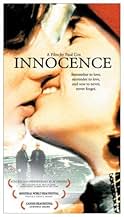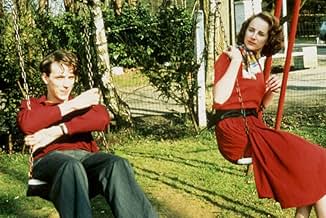Ajouter une intrigue dans votre langueAndreas reconnects with Claire, rekindling their love affair after forty years apart. Complications include health risks, death, and potential impact on John.Andreas reconnects with Claire, rekindling their love affair after forty years apart. Complications include health risks, death, and potential impact on John.Andreas reconnects with Claire, rekindling their love affair after forty years apart. Complications include health risks, death, and potential impact on John.
- Prix
- 9 victoires et 6 nominations au total
Charles 'Bud' Tingwell
- Andreas Borg
- (as Charles Tingwell)
Jo Kennedy
- Sally
- (as Joey Kennedy)
Avis en vedette
In these times of recovery from terrorist-caused disasters, as our country feels threatened with a kind of national paranoia, this lovely film brings its humanity to our torn psyches. It solves nothing...nor does it pretend to. The rare depiction of elderly lovers as well as the considerations of the relation of death to life in a non-maudlin fashion are to be applauded. Paul Cox has brought us a film to savor, rich with imagery, fine performances and thoughtful concepts. As with his splendid film "Lonely Hearts" the poignancy of relationship, and the need of the human spirit to be fulfilled through love and sexuality is dealt with sensitively and with a maturity of vision. I highly recommend this film to anyone, young or old, looking for more than sensationalism, special effects or a quick fix.
As a woman of 'a certain age' I speak from experience. The sentimentality seemed to me to be excessive. I found the story to be plausible, and the cast superb; it was in the execution that Paul Cox revealed an idealistic approach to men and women in love (at any age). I swear I aged an entire year during this 90-minute experience. I found myself taking deep breaths, wanting to say "Move it along, Paul, give up the ponderosity, let's see the amazing vitality that a love affair injects into formerly perfunctory lives. (That, unfortunately, happened in only one scene ... at the home of friends.) The flashbacks to the young lovers seemed repetitious because there was no progression, no development of the characters Again, I wanted to say, "We get it, Paul, we get it, they were in love--and no different from any couple in love." The ending could have been so much more interesting if Mr. Cox had not, indeed, taken the easy way out. However, I salute the effort to depict us oldsters as something other than grumpy grannies/gramps or eccentric fools.
You expect thought-provoking films from Paul Cox, the director of Man of Flowers (1983), My First Wife (1984) and other films that take an uncompromising or quirky view of life. This film is another in that fine tradition.
Who hasn't thought about a first love and wondered? Perhaps wondered whether the break, when it came, was the right move? Or wondered why it broke off? Or wondered about a countless number of things that might or might not have happened?
Using that idea as the starting point, Cox constructed an intricate visual narrative about what could happen should an aging man a widower choose to contact the woman he first loved some forty-five years earlier, with the view of finding out how her life has turned out.
A perfectly innocent idea, one could think. Except that, when contacted, the man discovers that the woman is still married. Undeterred, he also realizes he is still as passionate now or more so and sets out to rekindle the flame of their youth. Equally she responds, at first tentatively, but soon with reckless abandon.
And so begins the re-awakening of a first love that both parties thought had withered away...but not entirely forgotten by either. And so, the fundamental question that Cox asks his players to portray, however, is this: just what sort of love is it now, after forty plus years? Is it still true love? Is it simply lust? Is it a mix? More importantly, what is love, after all?
With such a topic, this could have been reduced to a banal pot-boiler, a weepy soap, or grand melodrama in the hands of less experienced writer/directors. It's none of those: instead, it's a mature enquiry into the true nature of married love versus romance. Affairs, of course, have been a staple of Hollywood and others, I guess, in such well-remembered films as An Affair To Remember 1959), The Last Time I Saw Paris (1955), Brief Encounter (1944) and many others.
None of that saccharine sentimentality forms any part of this narrative. Instead, it's so down to earth, I began to wonder whether Australia has a peculiar kind of love: different cultures handle this topic differently, for sure, but only in Australia, I think, would a woman leave her lover's bed, go home, and then start cooking dinner for her aggrieved husband. Are Aussies that stolid, that practical, or that uncaring? Even as an Australian, I'm not sure...
There's very little in the manner of hysterical lamentations or outraged ranting; and only the husband shows brief anger towards his grown son, the doctor who tries to counsel his mother and father to no avail, of course. What there's plenty of, however, is confusion, as each character tries to adjust to a couple in their mid-sixties having an open affair. So, as you might expect, there are moments of light comedy, wistful reminiscences, and, of course, rolling around in bed, locked together but very tastefully done.
But is it all realistic, and truly representative, given the setting, the culture, and their age? Well, I'm sure most of us have seen true-life results of affairs: most are not pretty; some are down and dirty; a few are murderous. In contrast, this affair is quiet, contained and very civilized.
But, in Australia, I've never seen oldies like myself rolling around on a riverside grass verge, or kissing passionately on a suburban train station; it could happen, however, I'll grant you. However, most older Aussies of the type portrayed - still have a remnant of that Celtic reserve brought over when the colony started in 1788; and it hangs on. Perhaps, then , Cox is simply holding up the idea that such an affair is possible, even between people who are so reserved, so settled and in the twilight of their diminishing years; and especially in Australia. In truth, I'd like to see that, and this story is as good as it gets, perhaps.
As the lover-come-back wannabe, Bud Tingwell, as Andreas, gives a great understated portrayal of a man who's found a new lease on life but, ironically, too late; Julia Blake, as Claire, is almost unbelievably stunning; Terry Norris, as John, the confused husband, is valiant in his efforts to win his wife back. The standout albeit brief performance, however, comes from Marta Dusseldorp, as Monique, Andreas's daughter whose care and concern for her aging father is achingly real.
My real criticism is with the script: at times, I was a bit uncomfortable with the lack of expletives you would expect to hear from people who are greatly upset emotionally, and all with diction that remains so perfectly enunciated, and with very little idiomatic or slang expressions. Not quite what you'd hear from Aussies in reality, I think, even those well educated and still religious, as they all apparently are. I doubt that even one of them said 'bloody'. Perhaps that was intentional by Cox, though, to garner a wider international audience?
Some may be disappointed in the ending as being too contrived, being almost a parody of an ecstatic whirling Dervish. My only thought is that there are so many endings that could happen. This was just one that had to happen.
Those aspects apart, it's still a fine story and film, and one that I'd recommend.
Who hasn't thought about a first love and wondered? Perhaps wondered whether the break, when it came, was the right move? Or wondered why it broke off? Or wondered about a countless number of things that might or might not have happened?
Using that idea as the starting point, Cox constructed an intricate visual narrative about what could happen should an aging man a widower choose to contact the woman he first loved some forty-five years earlier, with the view of finding out how her life has turned out.
A perfectly innocent idea, one could think. Except that, when contacted, the man discovers that the woman is still married. Undeterred, he also realizes he is still as passionate now or more so and sets out to rekindle the flame of their youth. Equally she responds, at first tentatively, but soon with reckless abandon.
And so begins the re-awakening of a first love that both parties thought had withered away...but not entirely forgotten by either. And so, the fundamental question that Cox asks his players to portray, however, is this: just what sort of love is it now, after forty plus years? Is it still true love? Is it simply lust? Is it a mix? More importantly, what is love, after all?
With such a topic, this could have been reduced to a banal pot-boiler, a weepy soap, or grand melodrama in the hands of less experienced writer/directors. It's none of those: instead, it's a mature enquiry into the true nature of married love versus romance. Affairs, of course, have been a staple of Hollywood and others, I guess, in such well-remembered films as An Affair To Remember 1959), The Last Time I Saw Paris (1955), Brief Encounter (1944) and many others.
None of that saccharine sentimentality forms any part of this narrative. Instead, it's so down to earth, I began to wonder whether Australia has a peculiar kind of love: different cultures handle this topic differently, for sure, but only in Australia, I think, would a woman leave her lover's bed, go home, and then start cooking dinner for her aggrieved husband. Are Aussies that stolid, that practical, or that uncaring? Even as an Australian, I'm not sure...
There's very little in the manner of hysterical lamentations or outraged ranting; and only the husband shows brief anger towards his grown son, the doctor who tries to counsel his mother and father to no avail, of course. What there's plenty of, however, is confusion, as each character tries to adjust to a couple in their mid-sixties having an open affair. So, as you might expect, there are moments of light comedy, wistful reminiscences, and, of course, rolling around in bed, locked together but very tastefully done.
But is it all realistic, and truly representative, given the setting, the culture, and their age? Well, I'm sure most of us have seen true-life results of affairs: most are not pretty; some are down and dirty; a few are murderous. In contrast, this affair is quiet, contained and very civilized.
But, in Australia, I've never seen oldies like myself rolling around on a riverside grass verge, or kissing passionately on a suburban train station; it could happen, however, I'll grant you. However, most older Aussies of the type portrayed - still have a remnant of that Celtic reserve brought over when the colony started in 1788; and it hangs on. Perhaps, then , Cox is simply holding up the idea that such an affair is possible, even between people who are so reserved, so settled and in the twilight of their diminishing years; and especially in Australia. In truth, I'd like to see that, and this story is as good as it gets, perhaps.
As the lover-come-back wannabe, Bud Tingwell, as Andreas, gives a great understated portrayal of a man who's found a new lease on life but, ironically, too late; Julia Blake, as Claire, is almost unbelievably stunning; Terry Norris, as John, the confused husband, is valiant in his efforts to win his wife back. The standout albeit brief performance, however, comes from Marta Dusseldorp, as Monique, Andreas's daughter whose care and concern for her aging father is achingly real.
My real criticism is with the script: at times, I was a bit uncomfortable with the lack of expletives you would expect to hear from people who are greatly upset emotionally, and all with diction that remains so perfectly enunciated, and with very little idiomatic or slang expressions. Not quite what you'd hear from Aussies in reality, I think, even those well educated and still religious, as they all apparently are. I doubt that even one of them said 'bloody'. Perhaps that was intentional by Cox, though, to garner a wider international audience?
Some may be disappointed in the ending as being too contrived, being almost a parody of an ecstatic whirling Dervish. My only thought is that there are so many endings that could happen. This was just one that had to happen.
Those aspects apart, it's still a fine story and film, and one that I'd recommend.
Paul Cox's "Innocence" is a beautiful, poignant gem that deserves your attention. It is a film that manages to be both realistic and completely uncynical at the same time(an unusual achievement these days).
The story concerns two people who were lovers as teenagers, separated, and meet again fifty years later. Upon meeting again they realize that they're still in love. It probably sounds sickeningly corny but it doesn't play that way. Cox details how the reigniting of their affair affects the people around them(friends, his daughter, her son and husband)and allows time for exquisitely intelligent conversations, my favorite of which takes place between the male protagonist(Charles Tingwell)and a priest concerning the reality of God.
"Innocence" is luminous.Seek it out.
The story concerns two people who were lovers as teenagers, separated, and meet again fifty years later. Upon meeting again they realize that they're still in love. It probably sounds sickeningly corny but it doesn't play that way. Cox details how the reigniting of their affair affects the people around them(friends, his daughter, her son and husband)and allows time for exquisitely intelligent conversations, my favorite of which takes place between the male protagonist(Charles Tingwell)and a priest concerning the reality of God.
"Innocence" is luminous.Seek it out.
Paul Cox's Innocence is an unconventional, often very poignant love story about an old man named Andreas (Charles Tingwell) who writes to his first love Claire (a simple yet complex Julia Blake) and the two meet again. Claire has had a husband John (Terry Norris) for a number of decades now, and yet by some powerful if inexplicable force they fall in love once again as they did when they were 16. However this affair comes as a shock to John, but the story unfolds as if it weren't trying to reach any total, formulaic conclusion; which is just one of the films many strong points.
The other strong points come from the terrific performances by Tingwell, Norris and especially Blake who act they're roles with a realism and heart you don't see often in love stories. And of course, Cox delivers fine direction and an even finer script to the mix. Only 2 flaws get in the way- things could've been explained a little better here and they're when it came to some of the reasoning and emotion, plus the ending was a downer. Otherwise, it's a quite worthwhile picture, especially for fans of Cox, or for anybody sick of seeing films up on the marqui with names like Glitter and Soul Survivors. Grade: Between A & A-
The other strong points come from the terrific performances by Tingwell, Norris and especially Blake who act they're roles with a realism and heart you don't see often in love stories. And of course, Cox delivers fine direction and an even finer script to the mix. Only 2 flaws get in the way- things could've been explained a little better here and they're when it came to some of the reasoning and emotion, plus the ending was a downer. Otherwise, it's a quite worthwhile picture, especially for fans of Cox, or for anybody sick of seeing films up on the marqui with names like Glitter and Soul Survivors. Grade: Between A & A-
Le saviez-vous
- AnecdotesOne of five feature films made in South Australia which were written and/or directed by Australian auteur Paul Cox. The pictures are: 'Innocence' (2000), 'Human Touch' (2004), 'Lust and Revenge' (1996), the 'Winners' series episode tele-movie short feature 'The Paper Boy' (1985), and the documentary feature 'The Diaries of Vaslav Nijinsky' (2001). He also later directed the feature documentary 'Paul Cox directs the Diary of Nijinsky' (2014) which was about the making of the latter.
- Bandes originalesJerusalem
(uncredited)
Lyrics by William Blake
Music by Hubert Parry
Played on the organ by Andreas in the last church scene
Meilleurs choix
Connectez-vous pour évaluer et surveiller les recommandations personnalisées
- How long is Innocence?Propulsé par Alexa
Détails
Box-office
- Brut – États-Unis et Canada
- 2 202 382 $ US
- Brut – à l'échelle mondiale
- 3 034 980 $ US
Contribuer à cette page
Suggérer une modification ou ajouter du contenu manquant





















